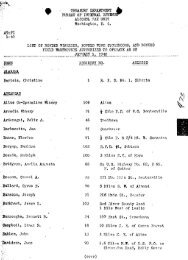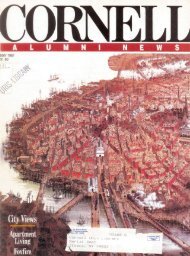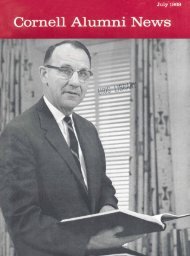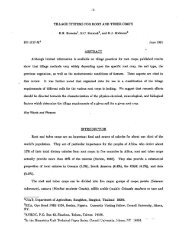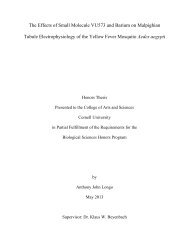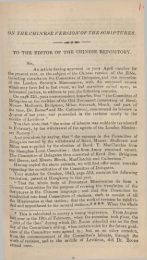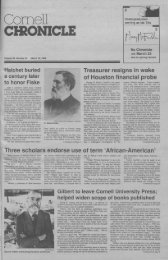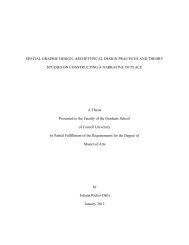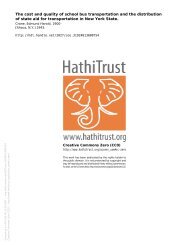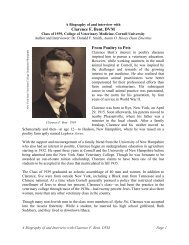1/1 - eCommons@Cornell - Cornell University
1/1 - eCommons@Cornell - Cornell University
1/1 - eCommons@Cornell - Cornell University
- No tags were found...
You also want an ePaper? Increase the reach of your titles
YUMPU automatically turns print PDFs into web optimized ePapers that Google loves.
Acting on a tip from two <strong>Cornell</strong><br />
students believed to be members of<br />
Theta Delta Chi (which lost university<br />
recognition after a 1991 hazing<br />
incident), the Ithaca City Police and<br />
<strong>Cornell</strong> Police found the stolen goods<br />
in a 30-by-40-foot room secured by a<br />
bank vault door and an electronic<br />
surveillance system, according to<br />
<strong>Cornell</strong> Police senior investigator<br />
Scott Hamilton.<br />
Included in the collection was a<br />
coffin used to hold charters taken<br />
from other fraternities, two partial<br />
skeletons, trophies and plaques,<br />
tables and chairs, university paintings<br />
and busts, flags and street signs,<br />
and hands from the McGraw clock<br />
tower. And, in a tongue-in-cheek<br />
reflection of the secrecy of the tradition,<br />
every object with a face was<br />
blindfolded. "Little trophies had tiny<br />
black rags around to protect its eyes<br />
from the gaze of public scrutiny," said<br />
Stevens. "The moose on the wall had<br />
a mask around its eyes, the elk had<br />
a mask around its eyes, the photos<br />
had sunglasses on or the eyes were<br />
cut out or covered up."<br />
Stevens said he had no evidence<br />
to suggest how the thievery started,<br />
but speculated that it may have<br />
grown out of pranks common in the<br />
1950s. "A fraternity would steal a<br />
sorority [photo] composite until they<br />
would agree to a social event," he<br />
said. "They would see it as a prank<br />
and humorous. It appears this escalated<br />
to something much larger than<br />
that." On April 6, the <strong>Cornell</strong> Police<br />
filed charges with the university's<br />
judicial administrator against the 28<br />
members of the fraternity, asserting<br />
probable cause that each member<br />
knew the fraternity possessed stolen<br />
items and acted to impede recovery<br />
by keeping the items in a locked<br />
room, in violation of the Campus<br />
Code of Conduct.<br />
The case was resolved in mid-<br />
April when Sigma Phi accepted terms<br />
that placed the chapter on probation<br />
for two years and ordered the payment<br />
of $10,000 to the university by<br />
July 1 to support art historians and<br />
archivists in an inventory of <strong>Cornell</strong><br />
memorabilia. Members were also<br />
required to complete 35 hours of<br />
community service each; serve as<br />
monitors at the Libe Slope party on<br />
the last day of classes; hold a workshop<br />
on leadership and moral development;<br />
and return all stolen items<br />
as soon as permitted by the<br />
Tompkins County district attorney,<br />
who at press time was considering<br />
whether to file criminal charges.<br />
BELOVED TEACHER DIES<br />
ON DAY HE WAS TO<br />
RECEIVE AWARD<br />
Russian Prof. Michael J. Harum, a<br />
self-effacing and generous teacher<br />
and a brilliant and witty linguist, was<br />
killed in a car crash in early April,<br />
only hours before he was to learn he<br />
had received one of this year's Clark<br />
Distinguished Teaching Awards.<br />
Harum was 41 years old.<br />
The accident occurred on April<br />
7, during one of the last snow storms<br />
of an unusually bitter winter. Harum<br />
was driving to work on Route 13<br />
when he lost control of his Toyota<br />
sedan on the icy road near the<br />
Tompkins County Airport and slid<br />
into the oncoming lane. His car was<br />
broadsided and knocked off the road<br />
into a ditch. He was pronounced dead<br />
at the scene.<br />
News of the death of the young<br />
teacher who joined the Department<br />
of Modern Languages in July 1991<br />
and was fluent in Czech, French,<br />
German, Russian and Swedish, devastated<br />
many of his students and<br />
colleagues.<br />
"There are not enough words in<br />
any language, in every language, to<br />
describe Michael. They just won't<br />
do him justice," says Mel Haung '95,<br />
who had studied<br />
with Harum for two<br />
years. "It's the consensus<br />
that he is the<br />
favorite in the de-<br />
partment for all of<br />
us. Born in Rapid<br />
City, SD, Harum's<br />
love of languages<br />
began when he was<br />
a child and lived for<br />
a time in Denmark,<br />
France and Sweden.<br />
He earned a<br />
BA at St. Olafs College<br />
in Minnesota<br />
and an MA in Slavic<br />
JUNE 1994<br />
linguistics at the <strong>University</strong> of California<br />
at Los Angeles. He taught for<br />
three years at the <strong>University</strong> of California<br />
at Irvine before coming to<br />
<strong>Cornell</strong>.<br />
He is survived by his sister, Mary<br />
Hart, co-anchor of television's Entertainment<br />
Tonight, his brother, David,<br />
and his parents, Dorothy and Robert<br />
Harum of Fresno, California. The<br />
family has established the Michael J.<br />
Harum Memorial Slavic Languages<br />
Scholarship Fund in his memory.<br />
Donations may be sent to Robert<br />
Scott, <strong>Cornell</strong> Development Office,<br />
55 Brown Road, Ithaca, NY 14850.<br />
JGSM STARTS 12-<br />
MONTH PROGRAM<br />
The Johnson Graduate School of<br />
Management will launch a new 12month<br />
MBA program in June 1995<br />
for students who hold graduate degrees<br />
in scientific or technical fields.<br />
The program is the first of its kind to<br />
focus on a target group.<br />
"There are a significant number<br />
of highly qualified scientists and engineers<br />
in this country who could<br />
greatly benefit from an MBA education,"<br />
says JGSM Dean Alan G.<br />
Merten. "This program could fit individuals<br />
with degrees ranging from<br />
an MD or PhD in science to a<br />
master's of science or engineering."<br />
The program will allow individuals<br />
with advanced science or engineering<br />
degrees to gain management<br />
skills in their field or pursue management<br />
positions in other areas of<br />
business. It would also encourage<br />
technical and engineering companies<br />
'98 Undergraduate<br />
Acceptances<br />
Letters of admission were mailed on April 2<br />
to a total of 6,545 undergraduate applicants.<br />
Of these: 3,490 were men<br />
3,055 were women<br />
1,929 were minorities, including:<br />
1,139 Asian-Americans<br />
417 Hispanic-Americans<br />
346 African-Americans<br />
27 Native Americans



